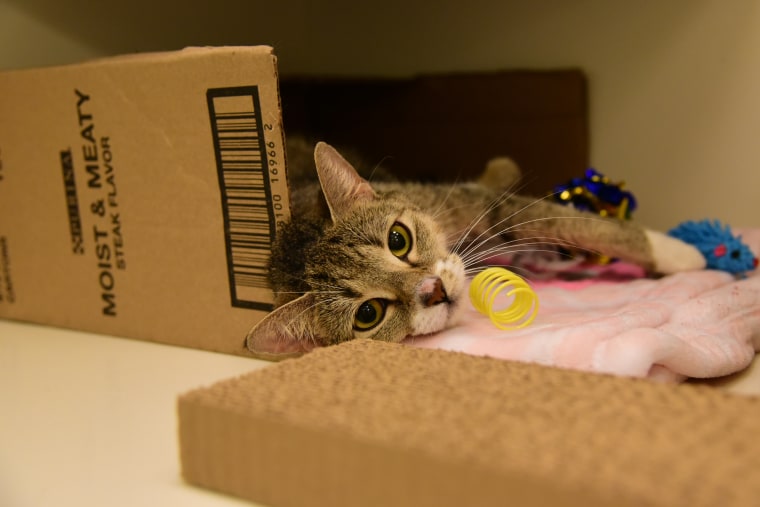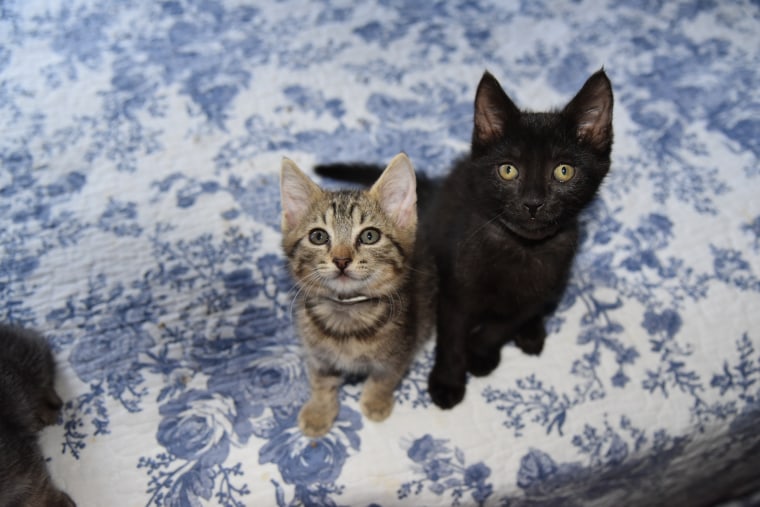When animal shelters scrambled to find foster homes for pets at the onset of the coronavirus pandemic, volunteers across the country answered the call.
“We’ve witnessed an incredibly compassionate response from people willing to open their homes to vulnerable animals in the shelters who need foster during this period of uncertainty,” Sydney Bartson Queen, animal behavior counselor for the nonprofit American Society for the Prevention of Cruelty to Animals, told TODAY. “It’s an amazing way to support your community, save a life and bring some added joy into your home.”

While we quarantine with pets — whether fosters or permanent members of our families — she said there are things we can do to help them realize their potential.
For starters, puppies need positive exposure to as many different experiences as possible. While it can be challenging during social distancing, Queen noted there are still ways to familiarize them with the world.
“Take lots of walks on different routes in all kinds of weather,” she said. “You can plan ahead so you have to pass by construction sites, buses, cars, strollers, skateboards, bikes, you name it — and you can do it all at a safe distance.”
When you pass by those things, try to get the pup excited with delicious treats and pay attention to their body language to make sure they don’t seem fearful or overwhelmed (if they do, take a break). You can also arrange play dates with another young, vaccinated dog who hasn’t been exposed to anyone who’s tested positive for COVID-19.
Inside, create obstacle courses for puppies with cardboard, plastic bags and tinfoil to walk over to practice feeling different textures under their paws.
“They’re at a period of time in their life when their little brains are just soaking up everything around them," said Queen, "so the more that they can be exposed to when they’re puppies, in a really positive way, the better they will react to those things in the future.”

Dogs of all ages benefit from enrichment exercises that stimulate their brains, from learning a new trick to searching for treats in “snuffle mats” or hidden in egg cartons, boxes or toilet paper rolls. Queen said many dogs enjoy “pupsicles.”
“You cut up treats or dog-safe foods into little pieces and freeze them into a cup of water. Then you can pop out that ice block and let them enjoy licking at it and trying to get down to the food,” she said.
Puzzle feeders are a great idea for both dogs and cats, so long as they’re separated from other household pets while playing with them. Cats can also have fun batting around a plastic bottle cap or pouncing on paper bags (be sure to cut off the handles first so they don’t get stuck). Hanging a bird feeder outside a window provides visual stimulation throughout the day.
Alone time is also important to get used to for when stay-at-home orders are lifted, so Queen suggested setting up a cozy area away from your remote work or school space so they can take a nap or enjoy a chew toy.

Many professional dog trainers and animal behaviorists are offering remote training opportunities and consultations during the crisis.
Dr. Stephanie Borns-Weil, a veterinarian and head of the Animal Behavior Department of Cummings School of Veterinary Medicine at Tufts University, emphasized the importance of using positive reinforcement — and trainers who use these techniques — rather than physical discipline with pets.

“I can’t think of a circumstance where physical punishment is necessary for a dog,” she told TODAY. “All it does is increase anxiety and fear. Studies have shown it can make a dog fearful of their owners. What kind of relationship do we want? Do we want a dog who is doing things because they fear us? Or do we want a dog that’s doing good things because it’s fun and because something good is going to happen to them?”
If a dog or cat suddenly starts exhibiting problematic behavior, she suggests checking with a veterinarian to make sure there’s not an underlying medical issue. For instance, one client’s dog suddenly started snapping at a young child. It turned out the dog had a painful ear infection causing the reaction.

Ultimately, offering the pets in our homes a positive pandemic experience will benefit everyone involved.
“The bond that you can build that’s built on real and meaningful love is really wonderful,” she said. “I think the time that we’re all together right now gives us an opportunity to really open that communication and build that bond.”

